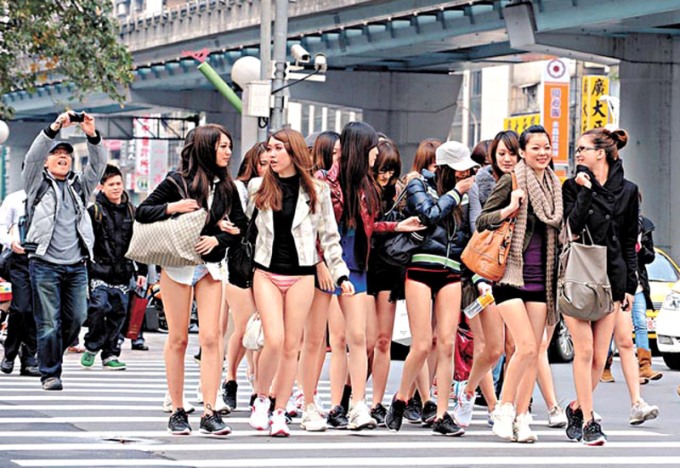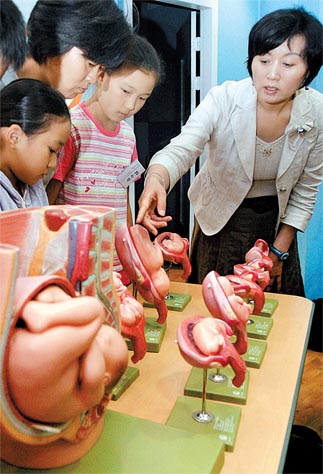 (Source)
(Source)
Well, I’d be lying if I said I didn’t always enjoy seeing attractive women in their underwear. But still, I can certainly understand objections to the way in which Reebok appropriated The No Pants Subway Ride in Taiwan last month. As commenter Riff complained:
Oh, lovely, thanks, my fellow Asian women, for perpetuating our cute-sexy-I’m-so-innocent-make-me-squeal stereotype, which somehow just gets worse when a whole crowd of you clones take off your pants for an advertisement to capitalize on the sexualization of women in Asia. Great job, girls. Continue being cute.
And Doug:
As usual for East Asia, they’ve taken the wacky and fun American version, and made it aggressively sexual and really creepy.
And Jedd Oliver noted that the original Chinese-language marketing indicated that Reebok was very much taking advantage of the “liberating the lower body” slogan of the unisex, New York-based Improv Everywhere original. Which strongly reminded me of the following point about the way the advertising industry sometimes deals with feminist criticism:
…some advertisers, aware of the objections of the feminist movement to traditional images of women in ads, have incorporated the criticism into their ads, many of which now present an alternative stereotype of the cool, professional, liberated women…Some agencies trying to accommodate new attitudes in their campaigns, often miss the point and equate ‘liberation’ with a type of aggressive sexuality and very unliberated coy sexiness (G. Dyer, Advertising as Communication, 1982, pp. 185-186)
 (Sources: left, right)
(Sources: left, right)
But to play devil’s advocate, Reebok has already been using such “assvertising” for its EasyTones for a very long time, as have other companies with similar products (which as you can see above, includes the obligatory reference to one’s “S-line” in Korean versions). So, while I remain dismayed then, that, yet again, something that uses false advertising to encourage women not to exercise has become so popular, arguably this campaign is just a flesh and blood version of what people have already been seeing on subway trains for years.
What do you think? (via SeoulPodcast)
2) Newest phenomenon in South Korean prostitution: hug rooms
Ho-bba, jeong-bba, D-bba (all forms of host bars) yesterday, and now this. Frankly, it’s becoming difficult to keep track of all the ways brothel-owners easily circumvent Korea’s asinine prostitution laws.
3) KoreAm interviews Lisa Lee, founder of Thick Dumpling Skin, “the new community website focused on Asian Americans, eating disorders and body image”
4) “Not all population trends are bad in Korea”
Or are they? While I’d like to report on good news if and whenever possible, I’m not sure that the recent news that the Korean “sandwich generation” – those financially responsible for both children and parents – isn’t as big as expected is quite enough to compensate for Korea’s coming demographic crunch. As, indeed, the World Street Journal tacitly admits in its conclusion to its own report:
After 2016, though, things start to get really, really rough for South Korea. That’s when the working-age population starts to fall. Then, the number of people saving and paying taxes and contributing to the asset base will start to decline while the number of people drawing from the asset base will start to rise.
 5) Former president Kim Young-sam invited to kophino center in Philippines
5) Former president Kim Young-sam invited to kophino center in Philippines
Hopefully he will actually go, thereby drawing some much needed attention to the plight of fatherless Korean-Filipino children there.
As Robert Neff mentions, as of last year Koreans have replaced Americans as the biggest group of foreigners to visit the Philippines. And a 2009 Korea Times article also explains that the rise in numbers of Kophino is:
…a product of the mindset of Koreans who were visiting the Philippines to enjoy life but not to get married to Filipino women. Enjoying life, of course, means hitting strip bars, paying for sex and getting temporary Filipina girlfriends.
They never think of marrying Filipino women and just enjoy their lives here, she said.
But, for some Filipino women, they consider relationships with foreigners as their ticket out of poverty. Unfortunately, this often turns out to be wishful thinking as Korean men quickly abandon the women after a night of sex or when they learn they are pregnant.
Son explained that the Korean cultural history of disapproving of mixed marriages has been a factor in the abandoning of Filipino children.
6) Japanese trains equipped with anti-groping cameras
 7) Sex eduction in the spotlight
7) Sex eduction in the spotlight
While it’s slightly old, this December 2009 JoongAng Daily article provides an excellent summary of the dismal state of sex education in Korea, and which unfortunately is probably little different today. The caption to the picture on the right, for instance, mentions that “most of the nation’s practical sex education programs are only available outside the classroom”, and later the article discusses how progressive teachers’ efforts are frequently thwarted by parents’ complaints that showing students how to use the pill or put on condoms correctly, say, simply encourages them to be promiscuous.
Sigh.
8) Life at a Korean University
Strictly speaking, not a gender issue, but of course a knowledge of Korean university life is essential for understanding Korean 20-somethings. See here for a handy quick guide by The Three Wise Monkeys then, with 1 bad – but many good – anecdotes from the related “MT” (membership training) mentioned by Joe Seoulman here.
Meanwhile, the Hankyoreh reports that, unfortunately, living costs for university students are skyrocketing these days. And, to make things worse, they’re being excessively targeted by Christian evangelicals while on campus!
9) Seoul government extends location-tracing service for elementary school children
Although it’s a little difficult to keep track of all the pilot schemes that preceded this, Hanpolis provides a good summary of them in a September article here. And like that says, already the plan then was to have 75% of the city under the “U-Seoul Children Safety Zone” by 2014.
With one daughter just 2 years from starting school, I’m beginning to take a great interest in this, and am wondering if other cities are going to follow suit. And especially because of the rape of a middle school girl by 4 of her classmates in Busan last month, which occurred just a couple of subway stops from my apartment.
 (Sources: left, right)
(Sources: left, right)
10) The Jang Ja-yeon Letters
Two years after actress Jang Ja-yeon (장자연) committed suicide over being forced by her management companies to have sex with various entertainment, media, and business executives, the revelation that 50 handwritten letters have emerged in which she names them – 31 in all – has rocked the Korean public. Like the Wall Street Journal explains:
Reaction on Internet forums and micro-blogging site Twitter show that people are seething. An unverified list of the men purportedly identified in the letters has been widely circulated via Twitter, causing concerns that some can be falsely accused.
And the police who originally investigated are under fire for glossing over the case. South Korea’s media, who dropped the story shortly after rumors spread that some of the industry’s leading executives had liaisons with Ms. Jang, is also under scrutiny.
See there and Global Voices for excellent summaries, the latter of which discusses some of those reactions on Twitter in more detail. Also, Omona! They Didn’t has a quick list of some of those names, as well as the International Forensic Science Laboratory’s refutation of claims that the letters were fabricated.
Meanwhile, actress Yoo In-na (유인나), who rose to prominence after her supporting role in the popular drama High Kick Through The Roof (지붕뚫고 하이킥), has alleged that she was sexually harassed by her former entertainment agency CEO. And Asian Correspondent has translated an article that says that according to the National Human Rights Commission (국가인권위원회), “cases of sex discrimination and sexual harassment have increased 25-fold in the past eight years, from 13 cases in 2002 to 336 cases in 2010″.
Filed under: Korean Gender Reader Tagged: EasyTones, 유인나, 이지톤, 장자연, Jang Ja-yeon, Reebok, Yoo In-na




Recent comments